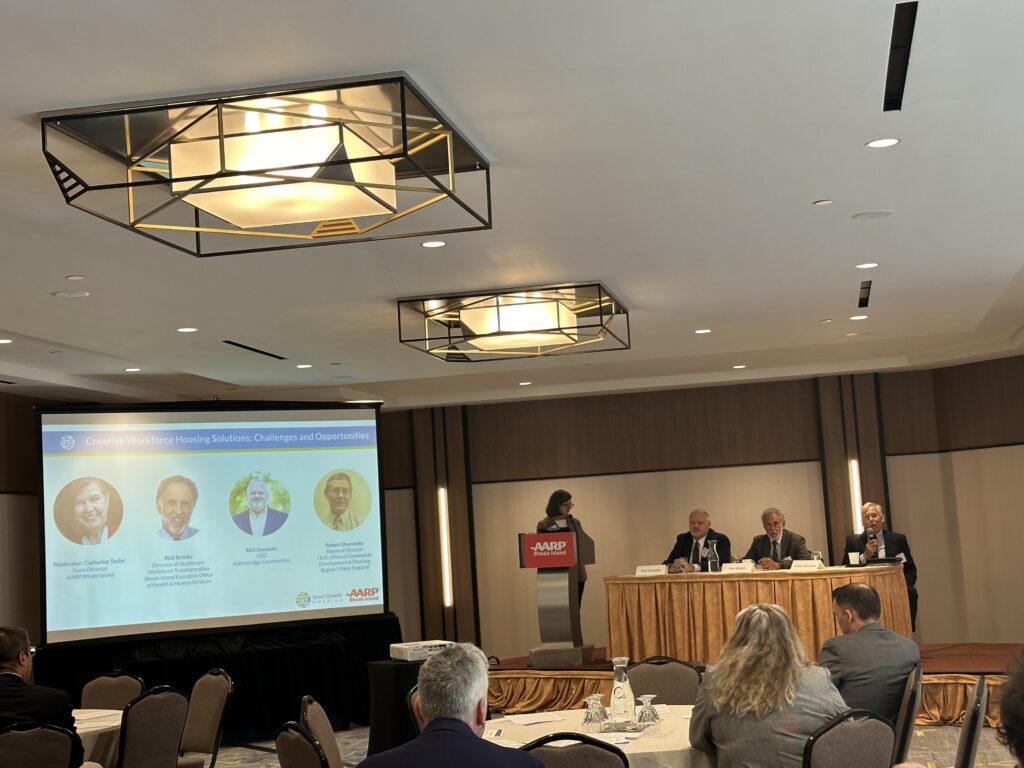Transportation for America and Smart Growth America’s technical assistance services help communities at all different stages of their efforts to improve transportation in their communities. In a suite of projects funded by AARP this year in communities across the country, we helped partners work on policy, planning, advocacy education and relationship building.

Smart Growth America technical assistance in Rhode Island, provided in partnership with AARP Rhode Island
Transportation for America does its work through technical assistance, thought leadership and advocacy. As part of our technical assistance work, for the past seven years, we’ve been supported by AARP to do small technical assistance projects helping partners improve transportation in their communities, whatever stage they may be in. This year was no exception. Projects in six different communities: Vermont; Albuquerque, NM; Fort Wayne, IN; San Diego, CA; Georgia; and Hawai’i; showcased the many different ways we can help.
Policy and funding in Vermont
The green mountain state is rural, and has snowy winters, as well as state highways running through hundreds of special, walkable small towns with unique character. AARP Vermont, in partnership with the Vermont Agency on Transportation and the Vermont League of Cities and Towns is exploring options to address state highways that pass through cities and towns throughout the state. These highways may have originally been built for higher speed car and truck traffic which is incompatible with more walkable environments that many communities wish to foster in their downtowns.
Vermont’s “Class 1 Town Highway” (C1TH) program has been in place for years to help cities take over management of state highways within town limits in order to implement more walkable designs, but challenges around maintenance costs, particularly for snow removal, have held the program up. To help address this T4America conducted research on policy and funding solutions that other northern states and Canadian provinces have used to address this challenge. Recommendations include state legislative action to address funding challenges, greater flexibility for localities to raise funding, VTRans support for design changes as part of the highway reclassification process, and quick-build demonstration projects to help communities envision the possibilities. AARP Vermont plans to use our research to inform conversations in Vermont’s next legislative session on how to address this challenge.
Policy and planning for an age-friendly Albuquerque
Albuquerque, New Mexico is motivated to become a more age-friendly city. They have dedicated staff working on an Age-Friendly Action Plan (AFAP) with domains in public engagement, housing and transportation, and annual progress reports. For two years, T4America has provided analysis of this plan in relation to other city plans, and helped Albuquerque to focus its efforts on near-term wins that can build a foundation for longer term change and a paradigm shift.
T4America’s recommendations included updating the cities Complete Streets policy, integrating housing and public transit plannings, and looking for opportunities to encourage public transit ridership and awareness.
Getting folks on the same page in San Diego
In T4A’s work with the San Diego region, AARP asked us to help with more general education on Complete Streets. With many engaged advocates ready to work on this issue, AARP planned an educational series of workshops to activate local partners and agencies to advance strong Complete Streets and Vision Zero policies in more jurisdictions in the region. Staff from our Thriving Communities team were able to provide level-setting information on what makes for a strong Complete Streets policy, while encouraging local jurisdictions to develop policies or improve the ones they already have.
Full blown advocacy in Fort Wayne
Last year, we worked with Fort Wayne, Indiana, doing something very similar to what we did this year with San Diego. Having provided an analysis of Fort Wayne’s Complete Streets resolution, which doesn’t carry the force of law, advocates in Fort Wayne were ready this year to work with their council and a new mayor to get a strong Complete Streets policy adopted. They already had the technical tools to develop a strong policy, but needed help with how to win the political support of the mayor and council, and how best to work with city staff with mixed views about a policy change.
In this case T4America developed an advocacy framework to help local advocates identify the steps toward building power and support for the policy change they sought. This included plans for building relationships with decision-makers, powermapping to identify channels of influence, and recommendations for developing effective messages and communications to undergird the advocacy effort.
Relationships, commitment and power in Georgia
Our project in Georgia this year was a little different than the rest. Our Associate VP for Transportation Steve Davis moderated a panel of leaders convened by AARP Georgia. Getting major leaders talking publicly about the improvements they plan to make in their communities can build their commitment to follow through with their plans and build closer relationships with the advocates who convened them. AARP Georgia has been using this approach to grow the number of cities in the peach state committed to age-friendly policies like Complete Streets, better public transit and housing options.
Beyond transportation
Our parent organization, Smart Growth America, uses transportation and land use strategies to support thriving, healthy communities. As part of our technical assistance projects supported by AARP, our Land Use and Development Director of Research Michael Rodriguez analyzed the affordable housing supply in Hawai’i. The work culminated in direct testimony to the Hawai’i Senate Committee on Housing. Learn more here.


